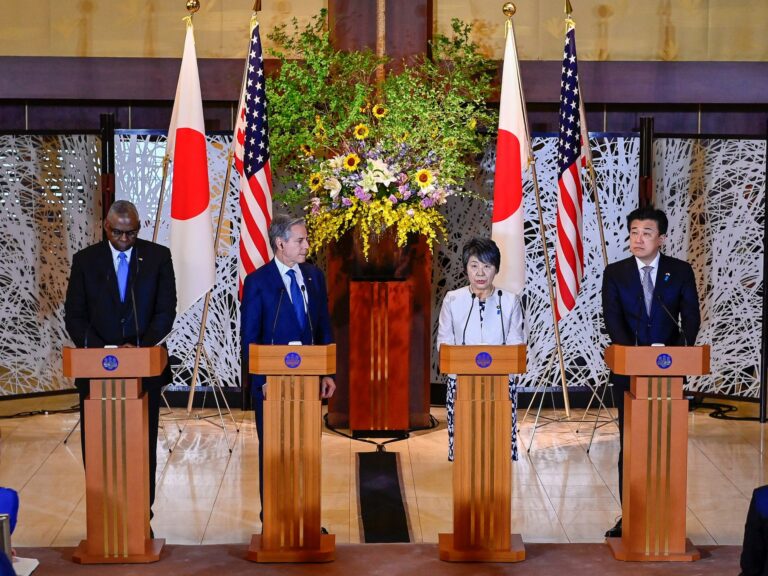The U.S. Defense Secretary said the strengthening of U.S. military headquarters in Japan was the most significant development between the allies.
The United States has announced plans to overhaul its military command in Japan to strengthen defense cooperation as the two countries face their biggest strategic challenge yet from China.
“The United States will elevate U.S. forces in Japan to a joint military command with expanded missions and operational responsibilities,” U.S. Defense Secretary Lloyd Austin told reporters after so-called “2+2” talks between the two countries’ defense and foreign ministers in Tokyo on Sunday.
“This is the biggest reform of U.S. forces in Japan since its establishment and will mark one of the greatest improvements in military relations with Japan in the past 70 years.”
Currently, there are about 54,000 U.S. military personnel stationed in Japan who deploy with a 19-hour delay to Indo-Pacific Command (INDOPACOM) in Hawaii, about 6,500 kilometers (4,000 miles) away. With this move, U.S. forces in Japan will gain stronger capabilities while continuing to report to INDOPACOM.
The revision comes after Russia said it would strengthen military ties with North Korea. Russian President Vladimir Putin visited North Korea last month as Moscow seeks to strengthen ties with Pyongyang amid a cooling in ties with the West. Moscow is also strengthening ties with Beijing following the country’s invasion of Ukraine.
The United States and Japan have said they are concerned about a “changing security environment” as China builds up its nuclear arsenal and expands production of weapons such as air-to-air missile systems.
In a joint statement issued after the meeting, the ministers said China’s foreign policy “seeks to reshape the international order for its own benefit at the expense of others” and that “such actions are of grave concern to our allies and the international community as a whole and pose the greatest strategic challenge in the Indo-Pacific region and beyond.”
The statement criticized Beijing’s “provocative” maritime actions, joint military exercises with Russia and the rapid buildup of its nuclear arsenal.
In his opening remarks, Austin said China was “attempting to change the status quo and engaging in coercive actions in the East China Sea, the South China Sea, around Taiwan and throughout the region,” adding that North Korea’s nuclear program and deepening cooperation with Russia “threaten regional and global security.”
But he told reporters the strengthening of the command was “not based on any threat from China” but reflected a desire for allies to work together more closely and effectively.
“Reconstructing the international order”
China’s Foreign Ministry did not immediately respond to a Reuters request for comment.
For the first time, the ministers also discussed “extended deterrence,” a term describing the U.S. determination to use nuclear power to deter attacks on allies.
“We are at a critical juncture. In order to thoroughly protect the existing international order, we need to continue to strengthen our alliance and increase our deterrence, or power,” Foreign Minister Yoko Kamikawa told reporters at the start of the meeting.
Craig Mark, a professor of international relations at Kyoritsu Women’s University in Japan, said Japan’s concerns were legitimate.
“From every perspective, Japan feels it is facing a more threatening environment, which has led to today’s meeting and the conclusion of a security agreement aimed at strengthening the U.S.-Japan alliance.”
Prompted by China’s growing military power and regular missile tests by nuclear-armed North Korea, Japan has in recent years made a dramatic shift from decades of postwar pacifism, announcing plans to double its defense spending to 2% of gross domestic product by 2022.
Allies also expressed deep concern about growing cooperation between Russia and China, Moscow’s procurement of ballistic missiles from North Korea in support of the war in Ukraine, and the possibility that Moscow may transfer weapons of mass destruction or missile-related technology to Pyongyang.

